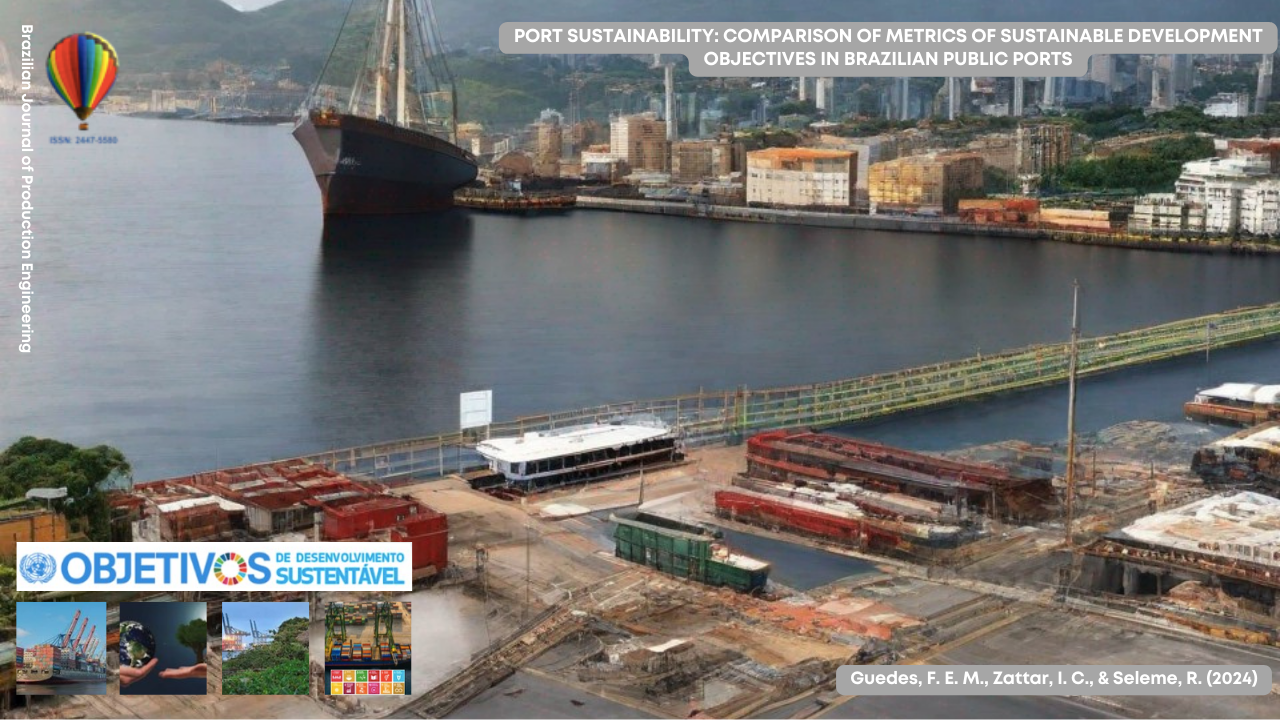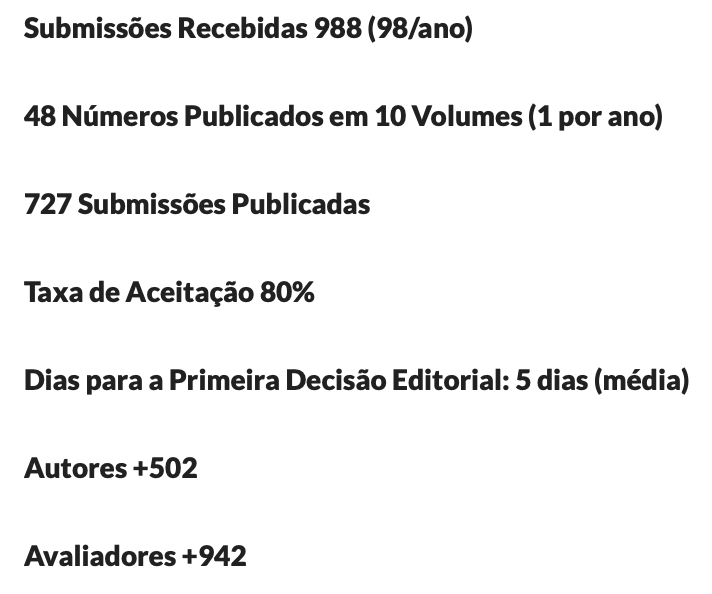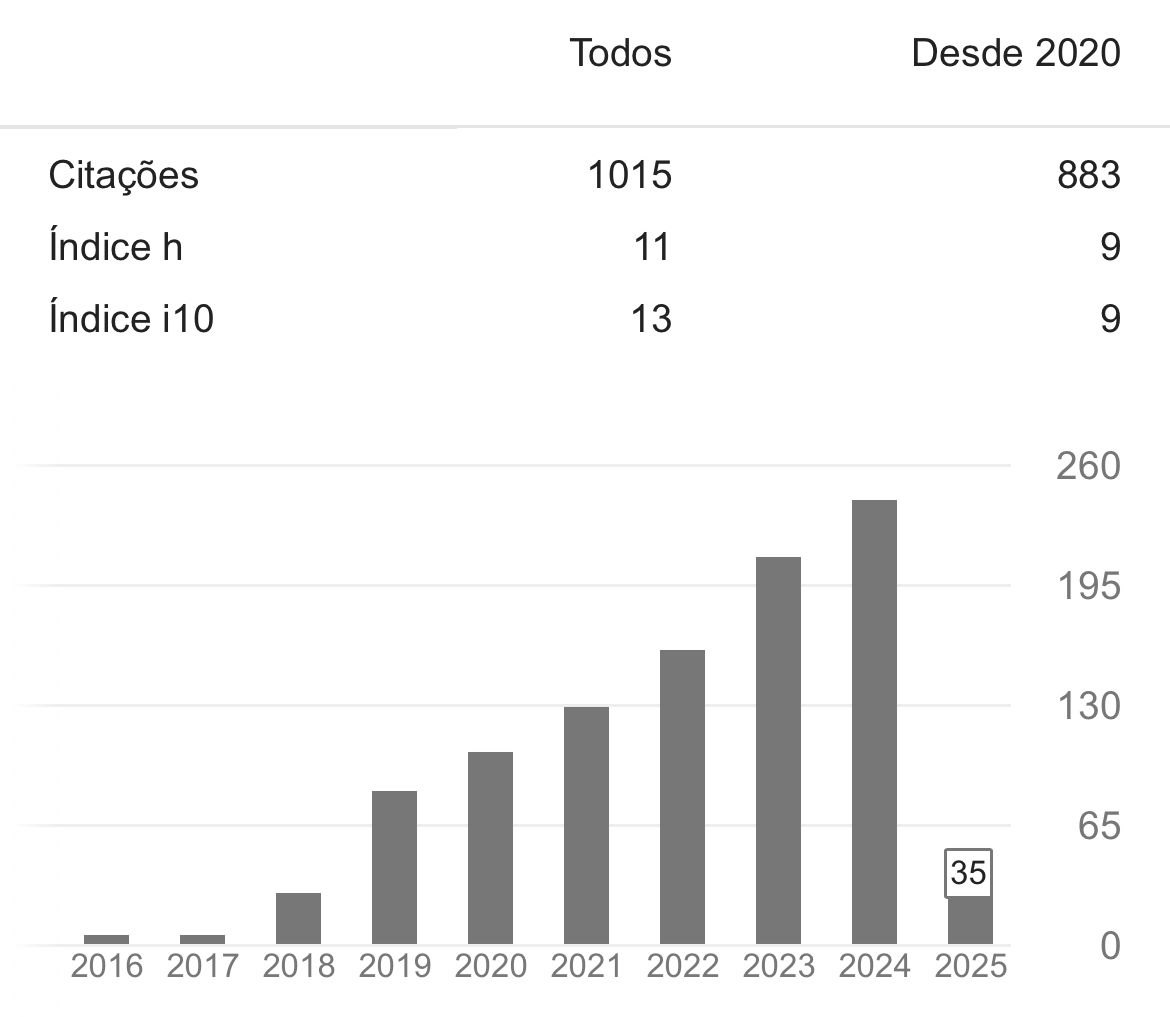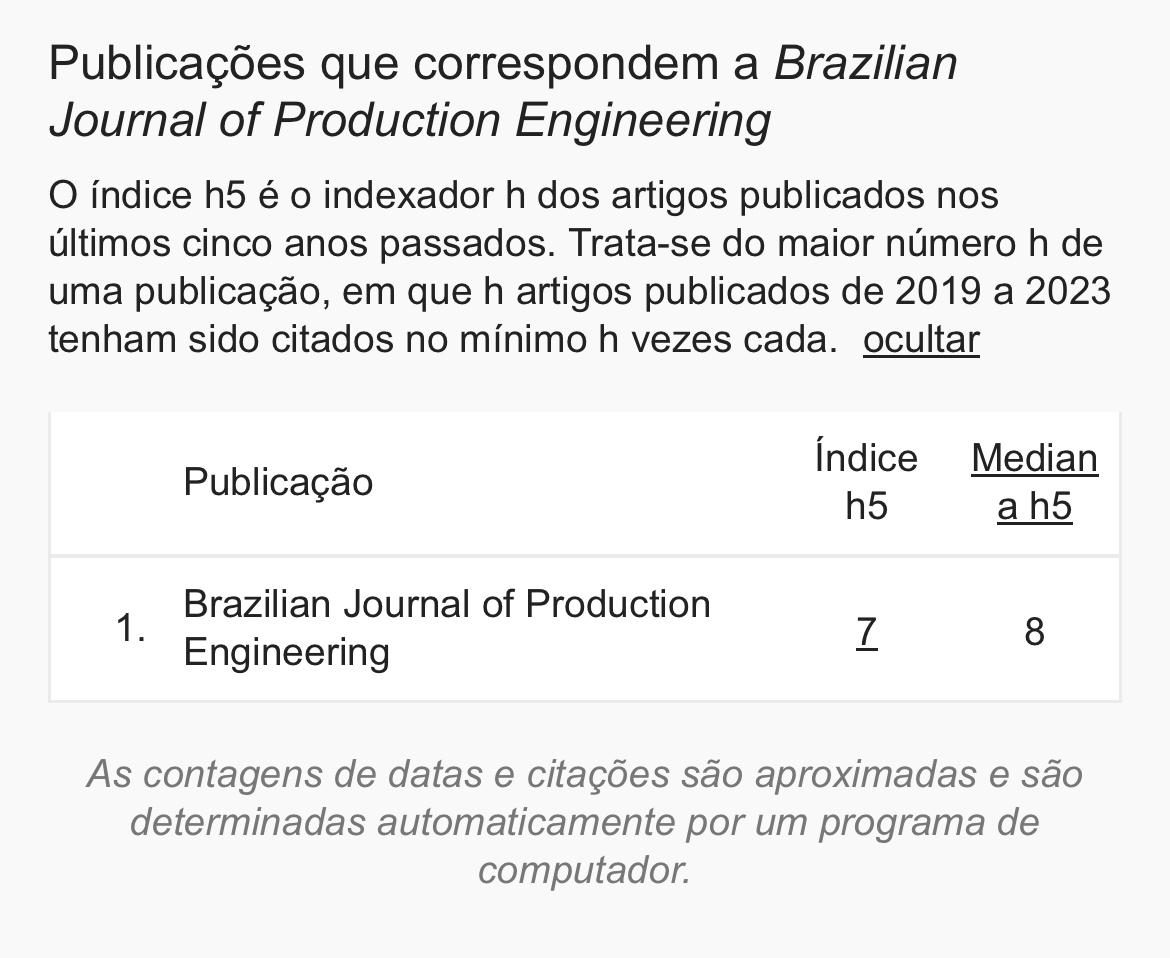Port sustainability: comparison of metrics of sustainable development objectives in Brazilian public ports
DOI:
https://doi.org/10.47456/bjpe.v10i2.43799Keywords:
Port Sustainability, Sustainable Development Goals, Brazilian public portsAbstract
Sustainability has been a growing topic in business conversations, highlighting the need to integrate practices aimed at the future and the next generations. Issues related to environmental preservation and social responsibility permeate different spheres of our society. Port Sustainability, in turn, reveals that a port's operations are not restricted to just receiving and dispatching ships. A sustainable port exceeds economic viability. This constitutes just one facet of the Sustainability principles, which encompass, in addition to economic considerations, social and environmental aspects. In this sense, the Sustainable Development Goals come into the discussion, with updated targets of the Millennium Goals to be achieved by 2030. Within this context, this article used as a methodology the combination of a systematic review of the literature, together with documentary analysis of the reports sustainability of Brazilian public ports. The main results present the SDGs most cited in literature focused on port sustainability, number of citations per port, keywords most cited in sustainability reports, among others.
Downloads
References
Abouelmagd, D., & Elrawy, S. (2022). Cultural Heritage and Sustainable Urban Development: the Case of Port Said city in Egypt. Cogent Social Sciences, 8(1). https://doi.org/10.1080/23311886.2022.2088460 DOI: https://doi.org/10.1080/23311886.2022.2088460
Banerjee, A. and Duflo, E. (2012). Review of Abhijit Banerjee and Esther Duflo, Poor Economics: A Radical Rethinking of the Way to Fight Global Poverty, Public Affairs, 2012, 303 pp. Journal of Philosophical Economics, V(2), 126–129. 10.46298/jpe.10627
Benamara, H., Hoffmann, J., & Youssef, F. (2019). Maritime transport: The sustainability imperative. In Sustainable Shipping: A Cross-Disciplinary View. https://doi.org/10.1007/978-3-030-04330-8_1 DOI: https://doi.org/10.1007/978-3-030-04330-8_1
BRASIL (2013) Lei. nº 12.815 de 5 de junho de 2013 - Recuperado de:
https://www.planalto.gov.br/ccivil_03/_ato2011-2014/2013/lei/l12815.htm
BRASIL (2019) Manual do investidor do setor portuário. Recuperado de: https://bit.ly/3I5vRuv
Caliskan, A. (2022). Seaports participation in enhancing the sustainable development goals. Journal of Cleaner Production, 379(P2), 134715. https://doi.org/10.1016/j.jclepro.2022.134715 DOI: https://doi.org/10.1016/j.jclepro.2022.134715
Carvalho, P., & Barcellos, F. C. (2014). Os Objetivos de Desenvolvimento do Milênio (ODMs) - uma avaliação crítica. Sustentabilidade Em Debate, 5(3), 222–244. Recuperado de: DOI: https://doi.org/10.18472/SustDeb.v5n3.2014.11176
http://periodicos.unb.br/index.php/sust/article/view/11176
Cellard, A. (2008). A análise documental - métodos. A Pesquisa Qualitativa: Enfoques Epistemológicos e Metodológicos, 295–316.
Cruz, D. K. A., Nóbrega, A. A. da, Montenegro, M. de M. S., & Pereira, V. O. de M. (2022). Os Objetivos de Desenvolvimento Sustentável e as fontes de dados para o monitoramento das metas no Brasil. Epidemiologia e Serviços de Saúde: Revista Do Sistema Único de Saúde Do Brasil, 31(spe1), e20211047. https://doi.org/10.1590/SS2237-9622202200010.especial DOI: https://doi.org/10.1590/ss2237-9622202200010.especial
Cuenca-García, E., Sánchez, A., & Navarro-Pabsdorf, M. (2019). Assessing the performance of the least developed countries in terms of the Millennium Development Goals. Evaluation and Program Planning, 72(September 2018), 54–66. https://doi.org/10.1016/j.evalprogplan.2018.09.009 DOI: https://doi.org/10.1016/j.evalprogplan.2018.09.009
Cunha, D. R., Pereira, N. N., de Santana Porte, M., & Campos, C. R. (2023). Sustainability practices for SDGs: a study of Brazilian ports. Environment, Development and Sustainability, 0123456789. https://doi.org/10.1007/s10668-023-03126-y DOI: https://doi.org/10.1007/s10668-023-03126-y
Darbra, R. M., Ronza, A., Casal, J., Stojanovic, T. A., & Wooldridge, C. (2004). The Self Diagnosis Method: A new methodology to assess environmental management in sea ports. Marine Pollution Bulletin, 48(5–6), 420–428.
https://doi.org/10.1016/j.marpolbul.2003.10.023 DOI: https://doi.org/10.1016/j.marpolbul.2003.10.023
Fonseca, L., & Carvalho, F. (2019). The reporting of SDGs by quality, environmental, and occupational health and safety-certified organizations. Sustainability (Switzerland), 11(20). https://doi.org/10.3390/su11205797 DOI: https://doi.org/10.3390/su11205797
Gani. A. (2017). The Logistics Performance Effect in International Trade. Asian Journal of Shipping and Logistics ,33(4),279–288.
https://doi.org/10.1016/j.ajsl.2017.12.012 DOI: https://doi.org/10.1016/j.ajsl.2017.12.012
GT Agenda 2030. Objetivos do Desenvolvimento Sustentável.(2015) https://gtagenda2030.org.br/ods/
Katuwawala, H. C., & Bandara, Y. M. (2022). System-based barriers for seaports in contributing to Sustainable Development Goals. Maritime Business Review, 7(3), 255–269.
https://doi.org/10.1108/MABR-02-2021-0007 DOI: https://doi.org/10.1108/MABR-02-2021-0007
Klopott, M. (2013). Restructuring of environmental management in Baltic ports: Case of Poland. Maritime Policy and Management, 40(5), 439–450. https://doi.org/10.1080/03088839.2013.798440 DOI: https://doi.org/10.1080/03088839.2013.798440
Macneil, J. L., Adams, M., & Walker, T. R. (2021). Development of framework for improved sustainability in the canadian port sector. Sustainability (Switzerland), 13(21).
https://doi.org/10.3390/su132111980 DOI: https://doi.org/10.3390/su132111980
Moratis, L., & Melissen, F. (2019). How do the sustainable development goals question rather than inform corporate sustainability? Resources, Conservation and Recycling, 141(November 2018), 253–254. https://doi.org/10.1016/j.resconrec.2018.10.043 DOI: https://doi.org/10.1016/j.resconrec.2018.10.043
Notteboom, T., van der Lugt, L., van Saase, N., Sel, S., & Neyens, K. (2020). The role of seaports in green supply chain management: Initiatives, attitudes, and perspectives in rotterdam, antwerp, north sea port, and zeebrugge. Sustainability (Switzerland), 12(4). https://doi.org/10.3390/su12041688 DOI: https://doi.org/10.3390/su12041688
Porto de Itajaí. Porto de Itajaí alcança a segunda colocação no prêmio nacional do IDA - índice de desempenho ambiental da ANTAQ. (2023).
Recuperado de:
Porto de Santos. APS recebe prêmio internacional pela 3ª vez consecutiva (2023). Recuperado de: https://www.portodesantos.com.br/2023/10/16/aps-recebe-premio-internacional-pela-3a-vez-consecutiva/
Porto de Suape. Suape é o mais premiado no Portos + Brasil 2023 (2023). Recuperado de: https://www.suape.pe.gov.br/pt/noticias/1793-suape-e-o-mais-premiado-no-portos-brasil-2023
Puig, M., & Darbra, R. M. (2018). The role of ports in a global economy, issues of relevance and environmental initiatives. In World Seas: An Environmental Evaluation Volume III: Ecological Issues and Environmental Impacts (Second Edi). Elsevier Ltd. https://doi.org/10.1016/B978-0-12-805052-1.00034-6 DOI: https://doi.org/10.1016/B978-0-12-805052-1.00034-6
Puig, M., Michail, A., Wooldridge, C., & Darbra, R. M. (2017). Benchmark dynamics in the environmental performance of ports. Marine Pollution Bulletin, 121(1–2), 111–119.
https://doi.org/10.1016/j.marpolbul.2017.05.021 DOI: https://doi.org/10.1016/j.marpolbul.2017.05.021
Rosati, F., & Faria, L. G. D. (2019). Business contribution to the Sustainable Development Agenda: Organizational factors related to early adoption of SDG reporting. Corporate Social Responsibility and Environmental Management, 26(3), 588–597. https://doi.org/10.1002/csr.1705 DOI: https://doi.org/10.1002/csr.1705
Sciberras, L., & Silva, J. R. (2018). The UN’s 2030 Agenda for sustainable development and the maritime transport domain: the role and challenges of IMO and its stakeholders through a grounded theory perspective. WMU Journal of Maritime Affairs, 17(3), 435–459. https://doi.org/10.1007/s13437-018-0147-2 DOI: https://doi.org/10.1007/s13437-018-0147-2
Soares, Cláudio de Jesus Marques. Casaca, A. C. P. (2022). Assessment of port governance model: evidence from the Brazilian ports. Maritime Business Review, 7(1), 70–85. https://doi.org/10.1108/MABR-03-2021-0026 DOI: https://doi.org/10.1108/MABR-03-2021-0026
Stanković, J. J., Marjanović, I., Papathanasiou, J., & Drezgić, S. (2021). Social, economic and environmental sustainability of port regions: Mcdm approach in composite index creation. Journal of Marine Science and Engineering, 9(1), 1–17. https://doi.org/10.3390/jmse9010074 DOI: https://doi.org/10.3390/jmse9010074
Vega-Muñoz, A., Salazar-Sepulveda, G., Espinosa-Cristia, J. F., & Sanhueza-Vergara, J. (2021). How to measure environmental performance in ports. Sustainability (Switzerland), 13(7), 1–18. https://doi.org/10.3390/su13074035 DOI: https://doi.org/10.3390/su13074035
Wang, X., Yuen, K. F., Wong, Y. D., & Li, K. X. (2020). How can the maritime industry meet Sustainable Development Goals? An analysis of sustainability reports from the social entrepreneurship perspective. Transportation Research Part D: Transport and Environment, 78 (December 2019), 102173.
https://doi.org/10.1016/j.trd.2019.11.002 DOI: https://doi.org/10.1016/j.trd.2019.11.002

Downloads
Published
How to Cite
Issue
Section
License
Copyright (c) 2024 Brazilian Journal of Production Engineering

This work is licensed under a Creative Commons Attribution-NonCommercial-ShareAlike 4.0 International License.

















































































